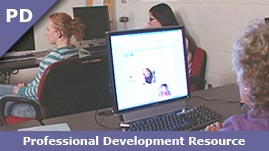Teachers' Domain - Digital Media for the Classroom and Professional Development
User: Preview

Source: Making Learning Real: "Feedback & Evaluation"
This media asset is from Making Learning Real: "Feedback & Evaluation."
With Problem-Based Case Learning (PBCL), students work in teams to develop and present solutions to real-world problems. In this video from Making Learning Real, students in an HTML class present their Web sites to the leader of a local non-profit. Then the instructor explains how she evaluates students’ work and talks about some of the project’s outcomes.
With Problem-Based Case Learning (PBCL), the instructor and a business partner identify a real-world problem and present it to students. Students work through the nine stages of the PBCL process in teams. They analyze the problem, conduct field research, make revisions based on their research, form hypotheses about the solution, and finalize their decisions in preparation for presenting them.
In the ninth and final stage of PBCL, Feedback and Evaluation, all participants evaluate student performance. They consider whether any of the teams need to revise their solution or their analysis of the problem. The business partner can also decide to use any of the solutions and to see if any of the teams can help implement them.
At the very end, the business partner and the instructor get together and evaluate various aspects of the project: the content of the course, the instructional approach (including the use of PBCL), and the value of all participants’ efforts. They might also plan work on future PBCL projects.
 Loading Standards
Loading Standards